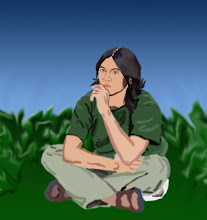Backstory: Maehadros was the son of a nobleman in one of the city-states of a particular unnamed continent. His father wanted him to apprentice to become a cleric, but Maehadros rebelled and ran off to a different city-state, and enlisted in the city guard there. Eventually the city he was working for came into conflict with his hometown, and Maehadros deserted the town guard. He found work as a mercenary, and was hired by what turned out to be a pro-human organization. While he didn't agree with their pro-human sentiments, he considered it a job, and helped them anyway. Eventually he became aware that they were a fairly radical cult, but continued to work for them until they gave him orders to kill the children of some local dwarves they had lynched. He then abandoned his job and fled on a ship away from the continent to avoid repercussions with the cult. This is how he wound up on the ship with the other Player Characters.
Character traits: The essence of Maehadros, or Mae, as he is generally known, is that he is a good person at heart, but lacks the courage to follow his heart. Instead he follows orders over his own judgement. By this point in his life, he is fully aware of the painful repercussions of not standing up for what he believes in, but has not implemented that in his life. Instead, he still follows the moral judgement of his new commanding officer (Tucker's warlord). His opinions mostly go in his journal, as always.
Other traits of the character include a town-guard sense of ethics, rather than the sense of an adventurer. He would rather bring his defeated foes to justice than to kill them, even if (as pointed out by other characters) bringing them to justice would doubtlessly lead to their execution. Again, he looks to authority other than his own, rather than making judgments on the lives of the defeated.
Character growth: Maehadros never had much opportunity to act upon his beliefs, partly due to me, the player, being pressured into not... complicating things. The party goes places, it kills things, it gets experience and loot, and I apparently wasn't supposed to call into question the ethics of all the things we were doing, let alone rebel against the judgement of the other players. Maehadros himself suffered a good deal of bullying by other players, mostly in terms of who was leading the party in the absence of Tucker and his character. (I was also somewhat disappointed to find that most of the party was neutral, and the paladin was of the "I'm a paladin, this gives me justification to kill things," style.) This was all cut short by Mae's untimely death.
Analysis: Maehadros deals with a lot of questions I have concerning righteous action, authority, and the subjectivity of morality, I suppose? And of social pressures? Dunno.
